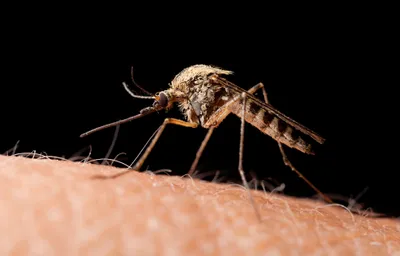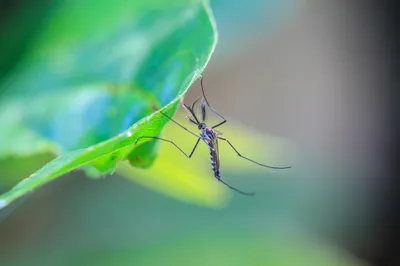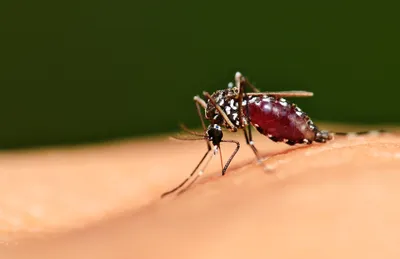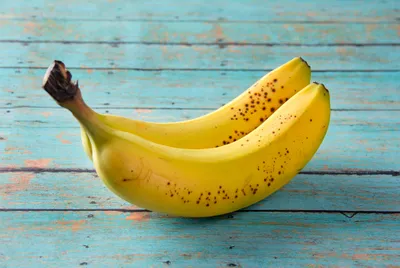It’s that dreaded time of year—when mosquitoes make their first annoying appearance after a season of cold, wet, and snow. The fact remains: these pesky insects aren’t going anywhere until we get frost! However, what is it that causes them to gravitate towards certain individuals, leaving their red, itchy bites behind while completely ignoring others? And what can you do to avoid those itchy stings?
From blood type to blood alcohol level to body weight, everyone claims to know what makes humans so tasty to mosquitoes. Read on for the true facts and laughable myths as to why mosquitoes bite…
1. Fact: Lactate in Your Skin
You may have heard that “sweet skin” can attract mosquitoes and cause them to bite you. While “sweet” skin isn’t really the proper scientific term, there is some truth to the fact that certain “sweet” chemicals your body, produced in the skin, can grab the attention of these pesky pests. Mosquitoes are attracted to lactate, a chemical produced in higher quantities when you exercise, though research has shown your body always produces some level of lactate. When you work out, lactate has the important role of giving you energy, among many other chemical processes that occur in the body.
According to the American Mosquito Control Association, mosquitoes can detect chemical signals, like lactic acid, from up to 25- to 35-meters away. So after you exercise, whether it’s a run outside, hitting the gym, or exercising in your own home, you may be more likely to be bothered by mosquitoes compared to someone who hasn’t just worked out. Certain foods may also cause the body to produce more lactic acid (i.e., yogurt and fermented foods like kimchi), making mosquitoes attracted to your “sweet” skin.
2. Myth: Blood Sugar Level
A lot of the misconceptions about why mosquitoes bite exist around what’s in your blood. It makes sense, since mosquitoes do pierce the skin and suck your blood. However, looking at the scientific proof, there’s no research to support this claim. Perhaps the most common myths of why mosquitoes bite is high blood sugar levels, which often leads to the idea that your diet and lifestyle make you a target for mosquitoes.
Mosquitoes are consistently mistaken for insects looking for tasty blood. However, mosquitoes are actually on the hunt for what they need to make eggs for reproduction. So rather than sugar in your blood, mosquitoes want iron and protein to help them reach their goal of creating eggs. So although it might seem like mosquitoes are always after you, most mosquitoes don’t tend to bite humans, but look to animals instead.
3. Fact: Body Odor
Just like lactate, body odor is another scent that draws mosquitoes to your skin in particular. In fact, sweat and body odor will attract them to bite you versus someone close to you who isn’t perspiring and releasing strong bodily scent. Quite often body odor is a result of exercise or other form of physical exertion, resulting smell and making you a prime target for mosquitoes. To help lower the risk of body odor, shower as soon after exercise
The attractive quality that mosquitoes just love is triggered by sweat from physical exertion. It’s the combination of your body odor, lactate, and increased release of carbon dioxide as you breath heavily that attracts mosquitoes and make your blood an enticing source of feeding. In addition the body is typically warmer during and following exercise. The higher your body temperature—the greater chance you have of being bitten.
4. Myth: Pregnancy
Expectant women and those who plan to have children in the future need not worry about extra discomfort in the form of red, itchy welts during pregnancy. The truth is that mosquitoes aren’t more attracted to you just because you’re pregnant. So you’re safe to venture outside the house during those long, nine months. It’s a bit of an old wives tale that pregnancy attracts mosquitoes, but there isn’t any scientific evidence to back up this popular misconception.
This common myth is catered around the claim that pregnant women release more carbon dioxide than the average person. Since there’s evidence that mosquitoes are drawn to the carbon dioxide we release via exhalation, there’s an assumption that pregnancy causes exertion similar to working out, which results in increased carbon dioxide output. However, while it can be more strenuous to move quickly and do things like take the stairs when you’re far along in your pregnancy, it doesn’t make you a mosquito magnet because you’re pregnant.
5. Fact: Genetics
Of all the claims surrounded why mosquitoes bite humans, scientists, researchers, and related health professionals agree that scent and genetics play the largest roles. You can understand how genetics play a role in the body scents and secretions you release, making some folks more attractive to mosquitoes and prone to annoying bites than others.
Genetics contribute to the likelihood of getting bitten because of naturally-released chemicals, body odors, and human skin secretions, which are all attractive to mosquitoes. According to an entomology study from the University of Florida, people who release greater amounts of uric acid are at a higher risk of getting bit by mosquitoes compared to those who release less. There are also certain bacteria in the skin, and based on our genetic make up, that make us more appetizing to the little blood-sucking vampires.
6. Myth: Blood Type
For years there has been a disagreement swirling among scientific researchers over whether or not blood type drives mosquito attraction or not. Claims that type O blood attracts mosquitoes more than other blood types is a common myth—even though there isn’t adequate research to support this claim. Until more robust research is done, the idea that certain blood types attract mosquitoes more than others will remain a myth.
The controversy about the role of blood type was studied by a group of researchers in 2004. The study, published by the National Institutes of Health, discovered that participants with blood type O attracted more Aedes albopictus (a species of mosquito) compared to test subjects with blood types A, B, and AB. In fact, overall those with type O blood were bitten roughly 84-percent more often compared to those with blood type A (bitten 47-percent of the time). Still, several studies since have discredited this claim, especially considering over 3,500 species of mosquitoes exist worldwide.
7. Fact: Carbon Dioxide Release
People who enjoy outdoor working out and doing sports outside during mosquito season often complain of being covered in bites. We’ve already established that sweating outside due to physical activity will put you at increased risk of mosquito bites. However, there’s more to the attraction than pure sweat. Scientific evidence suggests that mosquitoes are also drawn to carbon dioxide.
Like the other scents and chemicals that our bodies release, carbon dioxide is a well-known attractor of blood-sucking insects. The amount of carbon dioxide you release is largely dependant on your genes, as well as your size. According to a study published in the Annals of Internal Medicine, individuals with greater body size tend to be a greater target for mosquitoes because they release more CO2 and offer a wider skin surface to dine upon.
8. Myth: Potassium-Rich Foods
Just like some people believe eating garlic may repel mosquitoes or prevent them from taking a bite, there are also a lot of myths around certain foods and their ability to attract mosquitoes. One of the most popular misconceptions focuses on potassium-rich foods, such as bananas. While it would be simple to avoid eating certain foods to prevent mosquitoes bites, science claims it’s not that cut and dry.
Interestingly, for as many claims that state bananas repel mosquitoes—there are an equal amount of claims that suggest bananas attract blood-suckers. For instance, Susan Paskewitz, an entomologist at the University of Wisconsin, has made a career of studying mosquito biology and home remedies to repel bites. Paskewitz claims that despite the popular belief that eating certain fruits attract mosquitoes, her lab studies are largely inconclusive.











